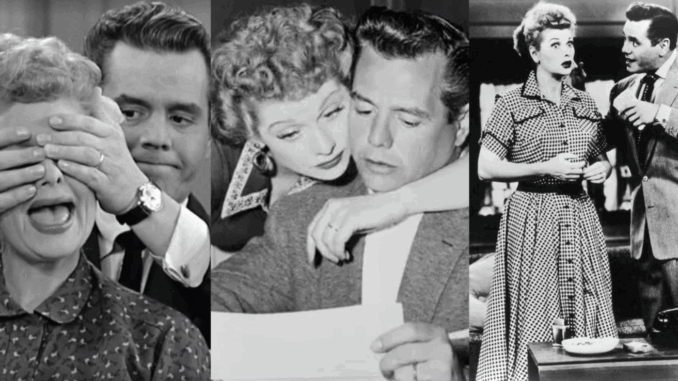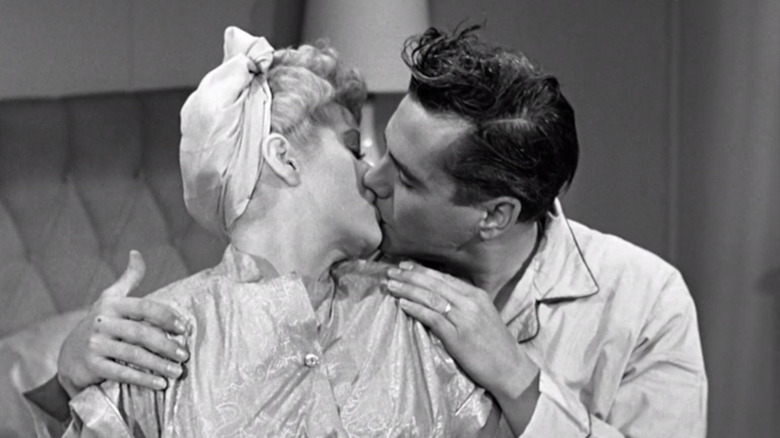
A Revolutionary Show Disguised as a Sitcom
When I Love Lucy premiered in 1951, America thought it was getting a cute comedy about a scatterbrained housewife. What it really got was the most radical experiment in television history—wrapped in laughs, wigs, and wild facial expressions.
Lucille Ball and Desi Arnaz weren’t just playing for ratings. They were rewriting the rules. And nearly every sitcom that followed—from The Office to Friends—owes a quiet debt to their gamble.
Lucille Ball Wasn’t Supposed to Succeed
At 40, Lucille Ball had spent decades in B-movie purgatory, known more for her red hair than any role. Radio gave her a second wind, but television? That was uncharted territory.
CBS offered her a TV show based on her radio hit My Favorite Husband. But Ball wouldn’t sign unless her real-life Cuban husband, Desi Arnaz, was cast alongside her. That request nearly killed the deal.
A Cuban accent on primetime? An interracial marriage on screen? In 1951, that was unheard of.
So they took the show on the road. Literally.
Vaudeville, Vinyl, and Victory
To prove audiences would accept them, Lucille and Desi created a traveling vaudeville act, combining slapstick with Latin flair. The result? Instant success.
Audiences didn’t just “accept” Desi—they adored him.
That tour forced CBS to reconsider. Against industry advice, they gave I Love Lucy a green light. But it came with zero guarantees.
What happened next changed the business of TV forever.
The Birth of the Multi-Camera Sitcom

Lucille and Desi didn’t want to shoot live in New York like everyone else. They wanted to film in Los Angeles—on 35mm film.
They asked to record the show with three cameras simultaneously, in front of a live studio audience. The networks scoffed. It was expensive and unnecessary.
So Desi made them an offer:
“We’ll take a pay cut. But we own the negatives.”
That single sentence changed the economics of television. Desilu Productions would soon control a goldmine of syndication rights.
The format they pioneered—three cameras, live audience, film quality—became the standard sitcom model for the next 70 years.
Lucy’s Pregnancy Was a National Event
In season two, Lucille Ball became pregnant in real life. Rather than hide it, they incorporated it into the show—something unheard of in 1952.
Even the word “pregnant” was banned from being spoken. Instead, characters awkwardly used “expecting.”
Still, when Lucy Ricardo went into labor on-screen, the country stopped to watch. That episode aired on the same day Lucille Ball gave birth to Desi Arnaz Jr. in real life.
It drew 44 million viewers—more than President Eisenhower’s inauguration that week.
Desilu Productions: An Empire Was Born
What started as one risky sitcom quickly became a television empire. Desilu wasn’t just producing I Love Lucy—it was shaping the future.
Ball and Arnaz poured their earnings into developing new shows. Under their leadership, Desilu greenlit The Untouchables, Mission: Impossible, and the original Star Trek.
Without Lucille Ball, Captain Kirk might never have boldly gone anywhere.
She wasn’t just a performer anymore. She was a studio boss. The first woman in Hollywood to run a major TV studio.
Behind the Laughter, a Marriage in Crisis
For all their on-screen chemistry, Ball and Arnaz were growing apart. The pressures of business, family, and fame took their toll. Desi’s drinking and affairs became public secrets in Hollywood.
They divorced in 1960, just one year after the final Lucy episode aired.
Still, they never stopped loving each other. In later interviews, Ball said, “I loved Desi until the day he died.”
Desi, in his final interviews, would reflect, “I Love Lucy was never just a title.”
A Legacy in Black-and-White
Today, I Love Lucy may seem like a relic from another era—corny, slapstick, a product of 1950s optimism. But that view misses its radical core.
The show:
-
Created the three-camera sitcom
-
Normalized syndication reruns
-
Showed a biracial couple in love on American TV
-
Gave a woman full control over a major production
-
Proved that comedy could break barriers
Lucille Ball didn’t just make people laugh. She made television smarter, bolder, and better.
Final Thoughts: A Legacy Carved in Laughter
More than 70 years later, I Love Lucy is still airing somewhere in the world every day. And not just out of nostalgia.
It endures because Lucille Ball insisted that television could be more—more real, more inclusive, more ambitious.
She didn’t ask permission. She demanded ownership.
And in doing so, Lucy didn’t just get into the show.
She took over the whole stage.